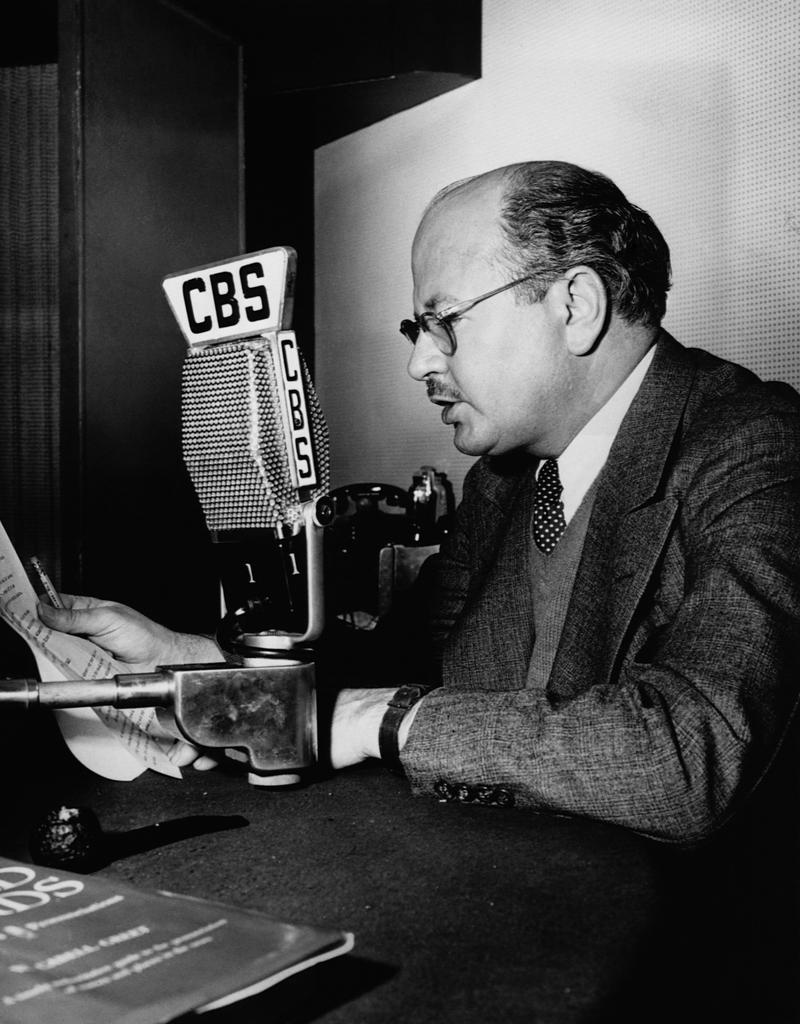William L. Shirer on Nazi Germany After 'The Rise and Fall of the Third Reich'

Though it is already two decades after the start of World War II, the shadow of Nazi Germany still looms large over this 1960 talk given by journalist and historian William L. Shirer at a Books and Authors Luncheon.
Promoting his best-seller, The Rise and Fall of the Third Reich, Shirer addresses the "somber mood" he has found in this country while on his lecture tour. "Americans are frightened to death that we're all going to be blown up by the hydrogen bomb." He compares his own early dismissal of Adolf Hitler with people's similar attitudes today toward Nikita Khrushchev.
Addressing the research for his history, he points out how unusual it was for the American and British armies to have captured almost all confidential German documents intact. This trove of information paints "an unbearably authentic picture of one of the darkest ages of all time." But what, he asks, are we to say of Germany today? After paying homage to German culture, its music and literature, he still seems to profess a fundamental distrust of the German ethos, concluding with the rather plaintive question, "The main problem concerns the German people. Has this people, so talented in so many ways, and so easily taken in by some barbarian, have they changed?"
Shirer was born in Chicago in 1904. After graduating from college, he baled hay on a cattle boat to pay his passage to Europe and by 1927 was working at the Paris office of The Chicago Tribune. There, he covered stories like Lindbergh's historic flight and fraternized with many of the famous expatriate writers and painters of the day. He reported on major events throughout the Continent as well as traveling in Afghanistan and India, where he became an intimate of Gandhi. In 1937, he relocated to Berlin and worked for the Universal News Service. There, in addition to reporting on the Nazis' rise to power, he was encouraged by the radio pioneer Edward R. Murrow to begin a series of broadcasts. Coupled with Murrow's broadcasts from London, these reports had a galvanizing effect on U.S. public opinion toward the coming war. The website traces.org contends that:
William Shirer perhaps shed more light on the events that led to Hitler’s ascendancy and German involvement in World War II than anyone else from the United States. Although closely watched in Germany, Shirer managed to convey much in his reporting by using subtle phrasing, suggestive tones of voice or U.S. slang unfamiliar to German censors trained only in formal British English.
At this time Shirer was also at work on his most enduring work, Berlin Diary (1941), which gives a sharp insider's look at members of the Nazi hierarchy while also detailing the increasingly dire travails of the ordinary Germans Shirer had met and befriended. Once the war began, Shirer returned to America and embarked on lecture tours as well as becoming a regular radio commentator and publishing a column for The New York Herald Tribune syndicate.
Shirer's life took an unexpected turn when, in the early 1950s, he was unofficially blacklisted for what were perceived as left-wing views. In his New York Times obituary, he recalled:
I became unemployable…I was broke, with two kids in school. Some of my friends were editors and would pay me for an article, but nothing was ever published. I then decided I would speak my piece on the lecture trail. I spent almost five years when my sole income was from one-night stands at universities. They were almost the only place in the country in the 1950s that still had some respect for freedom of speech.
Paradoxically, it was this enforced "retirement" from journalism that gave Shirer the time to gather the information and write his epochal history The Rise and Fall of the Third Reich (1960). This history was enormously popular in its day, although its accuracy and points of emphasis have since been questioned by historians. Richard J. Evans, for example, writing in The New Republic, complains of the very aspects that are evident in the above-cited talk:
Shirer seems in the end to have been taken in by Nazi propaganda that portrayed the regime as the fulfillment of long-held German dreams. He mixed with Nazi bigwigs to get information, but he did not make any effort to contact representatives — inside or outside Germany — of the millions of people, notably in the working-class districts of Germany’s great cities and the industrial areas of the Ruhr, who disliked most of what Hitler was doing and had vehemently opposed the Nazis before they came to power. …because of his skewed sources of information, Shirer rushed to sweeping conclusions about "the German character" that were embarrassing to read even in the 1960s, let alone today.
Shirer then turned to autobiography, publishing 20th Century Journey (1976), followed by The Nightmare Years (1984), and A Native's Return (1990).
Alan Brinkley, reviewing the final volume in The New York Times, concludes:
In many ways, Mr. Shirer has remained throughout his life what he was in his youth: a small-town Midwesterner with a straightforward, vaguely populist view of the world; a man who has never had much patience with the pessimism and ambiguity that suffuse Eastern intellectual life; a writer who has never offered much of an interpretation of the great events he has described, but has viewed them through the prism of his own basic decency and apparent innocence. He has responded to the great evils he has witnessed in the 20th century with a simple and in many ways appealing bewilderment, as things to be carefully and patiently chronicled but never to be truly understood.
Shirer died in 1993. He was 89.
Audio courtesy of the NYC Municipal Archives WNYC Collection.
Note: Due to recordings missing from the collection, audio above is incomplete.
